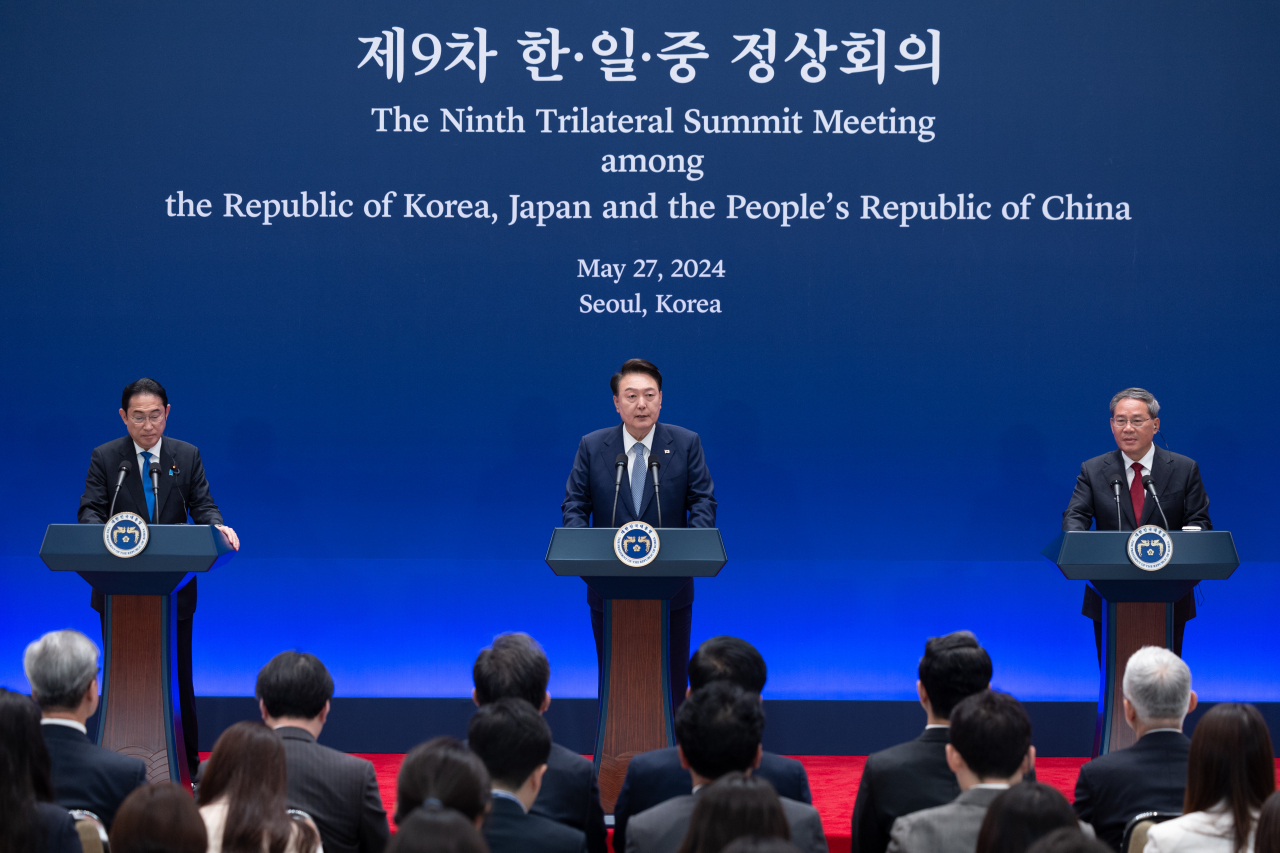China's use of 'denuclearization' in summit statement significant despite dilution: Seoul
By Ji Da-gyumPublished : May 27, 2024 - 18:16

The South Korean government on Monday underscored the significance of China's consent to include the phrase "denuclearization of the Korean Peninsula" in the joint summit declaration released earlier in the day, given the shifts in the geopolitical landscape including growing US-China rivalry and Beijing's deliberate avoidance of explicitly mentioning the phrase.
The joint declaration followed the first trilateral summit in around 4 1/2 years, hosted in Seoul, where South Korean President Yoon Suk Yeol, Japanese Prime Minister Fumio Kishida, and Chinese Premier Li Qiang convened.
The latest joint declaration, however, lacked the expression of a trilateral commitment to the "complete denuclearization of the Korean Peninsula," unlike the joint declarations issued after the seventh and eighth summits in 2018 and 2019.
The Joint Declaration released Monday stated, "We reiterated positions on regional peace and stability, denuclearization of the Korean Peninsula, and the abductions issue, respectively."
A senior Foreign Ministry official defended the absence of the phrase, acknowledging that its omission represented a toned-down stance compared to statements issued in 2015, 2018 and 2019.
"Given the current geopolitical situation, it's challenging for China to take the lead in securing an agreement on North Korea's denuclearization, as it has done previously," the senior official said during a closed-door briefing on condition of anonymity.
Despite these challenges, the official highlighted that the joint statement includes the term "denuclearization of the Korean Peninsula," underscoring the perseverance of prolonged negotiation efforts.
"While it's true that the content appears watered down compared to previous years like 2018, 2019 and 2015, I still believe that the inclusion of such an expression remains significant," the official said.
In 2015, the joint declaration read: "We decided to continue our joint efforts to resume meaningful Six-Party Talks at an early date to make substantial progress in the denuclearization of the Korean Peninsula in a peaceful manner."
The official explained that "China holds differing views on the North Korean issue to the extent that it refrains from using the term 'denuclearization of the Korean Peninsula' since 2023."
The official emphasized that China responded to South Korea's request, noting that South Korea hosted the trilateral summit in Seoul.
Regarding North Korea's denuclearization, while the language has been diluted, the South Korean official stated, "China's stance on denuclearization itself has remained unchanged."
The official added, "Despite divergent opinions on the pathway and methods of denuclearization, it's significant that the fundamental stance on denuclearization has been officially articulated in the joint statement by the leaders of the three countries."
The Korea Herald learned from dialogue with officials that South Korea, Japan and China were deeply involved in meticulous, painstaking negotiations, refining the language of the joint declaration until Monday morning.
The consensus reached by the three countries to include the sentence, "We agree to continue to make positive efforts for the political settlement of the Korean Peninsula issue" was also subject to compromise by South Korea and Japan, The Korea Herald learned. This was because "political settlement of the Korean Peninsula issue" is a phrase commonly used by China with North Korean issues.
Another Foreign Ministry official, who wished to remain anonymous, stressed that directly comparing Monday's statement to those from 2018 and 2019 is not fair. This is because, during that period, the international community was pushing for North Korea's "complete, verifiable, and irreversible denuclearization or CVID."
The official noted that the concept of "complete denuclearization" in the joint declarations issued in 2018 and 2019 without the inclusion of "verifiable" and "irreversible" elements represented a lower standard compared to CVID.
The official emphasized that Monday's statement regarding the denuclearization of the Korean Peninsula is "not of low significance" given the current circumstances.



















![[Today’s K-pop] Treasure to publish magazine for debut anniversary](http://res.heraldm.com/phpwas/restmb_idxmake.php?idx=642&simg=/content/image/2024/07/26/20240726050551_0.jpg&u=)